Church sports programs serve unique missions that extend far beyond scoreboards and trophies—they build Christian community, develop character through competition, teach biblical principles through athletics, and create welcoming environments where families connect around shared faith and healthy activity. From youth basketball leagues filling gymnasiums on Saturday mornings to adult softball tournaments fostering fellowship, these ministries impact thousands of participants annually while strengthening congregational bonds and community witness.
Yet many church sports programs struggle to appropriately celebrate the athletes, volunteers, and moments that make these ministries meaningful. Championship teams lack permanent recognition beyond fleeting social media posts. Volunteer coaches who dedicate countless hours receive minimal acknowledgment. Youth athletes who demonstrate Christlike character and athletic excellence go unrecognized. Meanwhile, families seeking church communities with strong youth programs find limited evidence of vibrant sports ministry during facility tours.
This comprehensive guide explores how churches can leverage interactive touchscreen recognition displays to celebrate sports ministry comprehensively, honor participants appropriately, strengthen community engagement, and demonstrate the vitality of faith-based athletic programs that integrate spiritual development with competitive excellence.
Effective church sports recognition extends beyond simply displaying trophies—it creates systems that celebrate character development alongside athletic achievement, honor servant leadership and volunteer contributions, preserve ministry legacy across generations, and demonstrate how athletics serve broader spiritual formation missions within faith communities.
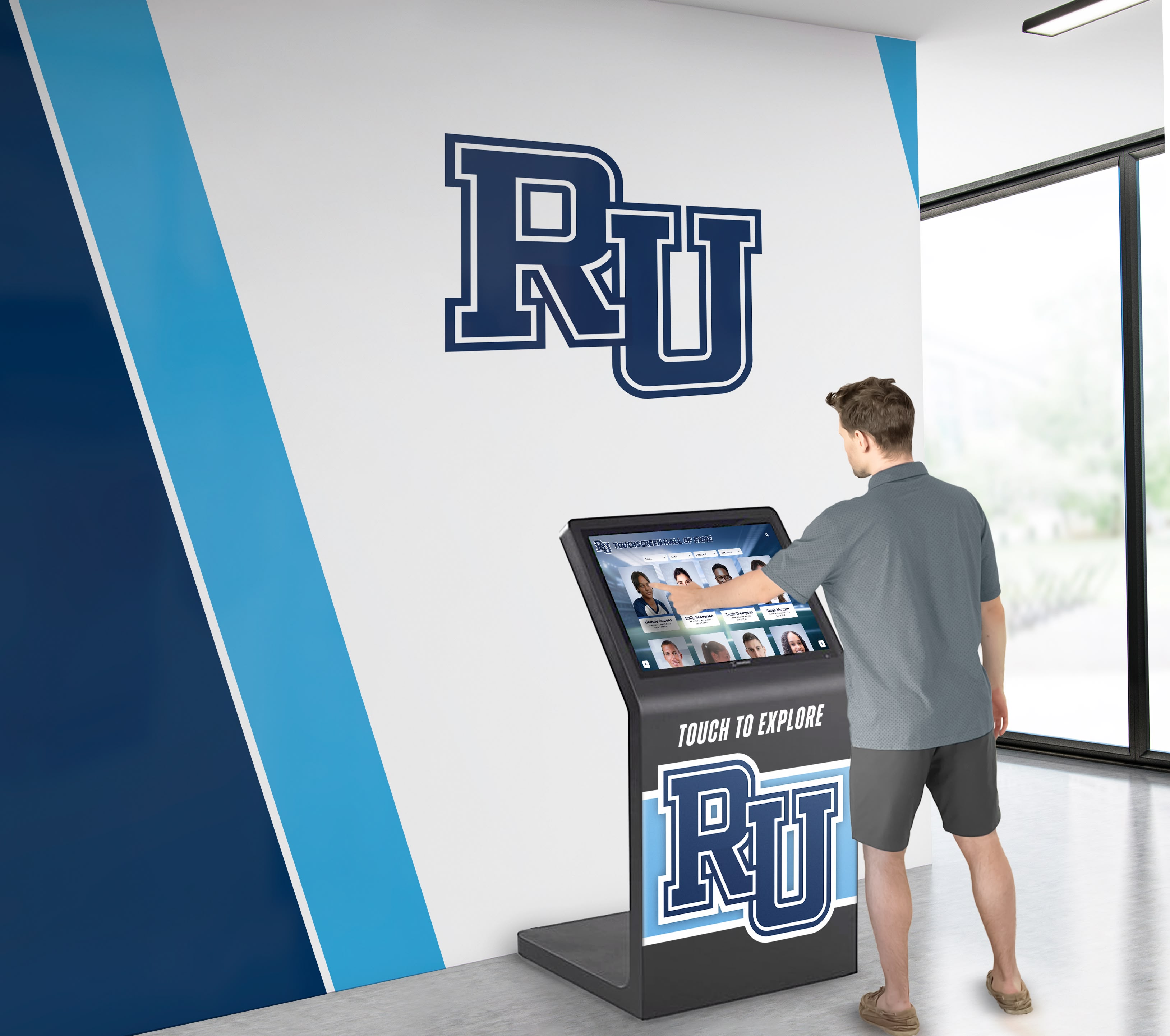
Modern interactive displays help churches celebrate sports ministry while reinforcing faith values and community connection
The Unique Character of Church Sports Ministry
Understanding how church athletics differ from school or club sports helps organizations design recognition programs that honor these distinctive purposes and values.
Mission-Centered Athletic Programs
Church sports programs exist primarily to serve spiritual formation and community building rather than competitive excellence alone, creating recognition priorities that differ from secular athletic contexts.
Faith Integration and Character Development
While winning matters, church sports emphasize character development through competition, biblical principles applied to athletic situations, servant leadership and team-first attitudes, grace and sportsmanship in victory and defeat, and integration of faith with all life areas including athletics. Recognition systems should celebrate these spiritual dimensions alongside competitive achievements.
Organizations report that highlighting character alongside championships creates more meaningful recognition that reinforces ministry values. When displays feature athletes demonstrating Christlike behavior, volunteers serving sacrificially, and teams showing exceptional sportsmanship, they communicate that these qualities matter as much as tournament victories.
Community Building Through Athletics
Church sports create community connections that strengthen congregations and extend ministry reach. Sports programs attract unchurched families providing relationship entry points, create inter-generational connections through multi-age leagues and events, build friendships across diverse congregation demographics, and provide natural fellowship opportunities around shared athletic interests.
Recognition celebrating community impact demonstrates how sports ministry serves broader congregational mission rather than existing as isolated recreational programming.
Learn about comprehensive community engagement strategies in community engagement ideas for organizations that build stronger connections through recognition and celebration.
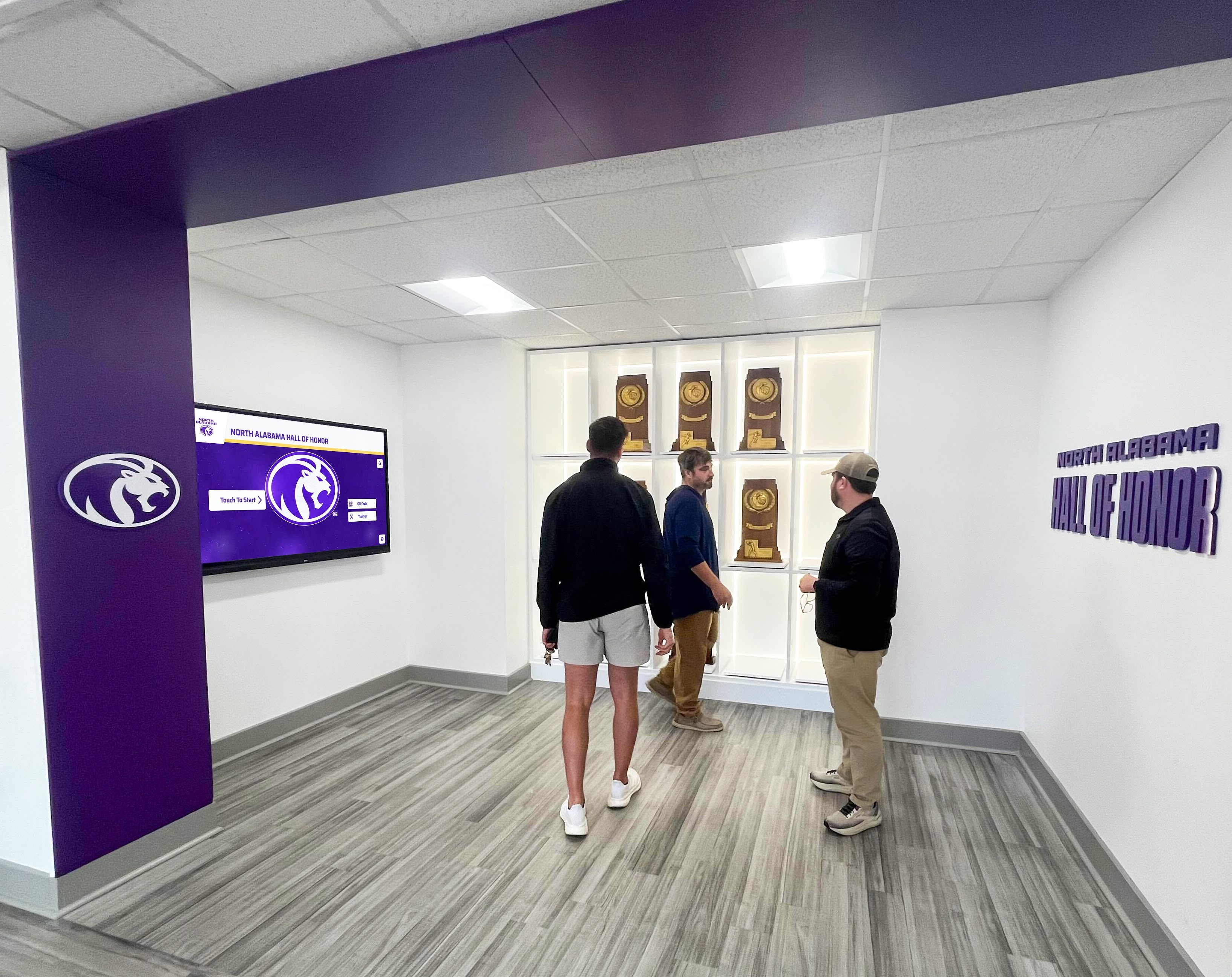
Church sports recognition creates gathering spaces where families connect around shared faith and athletic tradition
Multi-Generational Participation Patterns
Unlike school sports with age-limited participation, church athletics often include participants from elementary children through senior adults, creating unique recognition considerations.
Youth Sports Ministry
Children’s and youth sports programs typically represent the largest segment of church athletics:
Youth Program Characteristics
- Recreational emphasis over elite competition
- Character development and spiritual formation focus
- Volunteer coach dependence on parent and member participation
- Seasonal variety offering multiple sport options
- Age-appropriate skill development and game formats
- Family involvement and spectator engagement
Recognition for youth programs should celebrate participation and character growth as much as competitive success, honor developmental milestones appropriate to age groups, and acknowledge volunteer coaches and team parents whose service makes programs possible.
Adult Recreation and Fellowship Leagues
Many churches offer adult sports creating fellowship opportunities for members and community:
Adult Program Elements
- Softball, basketball, volleyball, and recreational leagues
- Mixed skill levels from competitive to purely social
- Evening and weekend scheduling accommodating work schedules
- Team-based friendships strengthening small group connections
- Outreach opportunities when leagues include community teams
- Long-term participation creating multi-year traditions
Adult league recognition celebrates sustained participation, acknowledges championship teams while honoring all competitors, and features social connections and friendships formed through athletic fellowship.
Volunteer-Driven Program Structure
Church sports depend almost entirely on volunteer leadership creating recognition priorities that secular programs may not emphasize.
Essential Volunteer Roles
- Coaches dedicating hours to practice and games
- Referees and officials ensuring fair competition
- League coordinators managing schedules and logistics
- Facility managers maintaining fields and gymnasiums
- Concession workers funding program operations
- Board members providing governance and vision
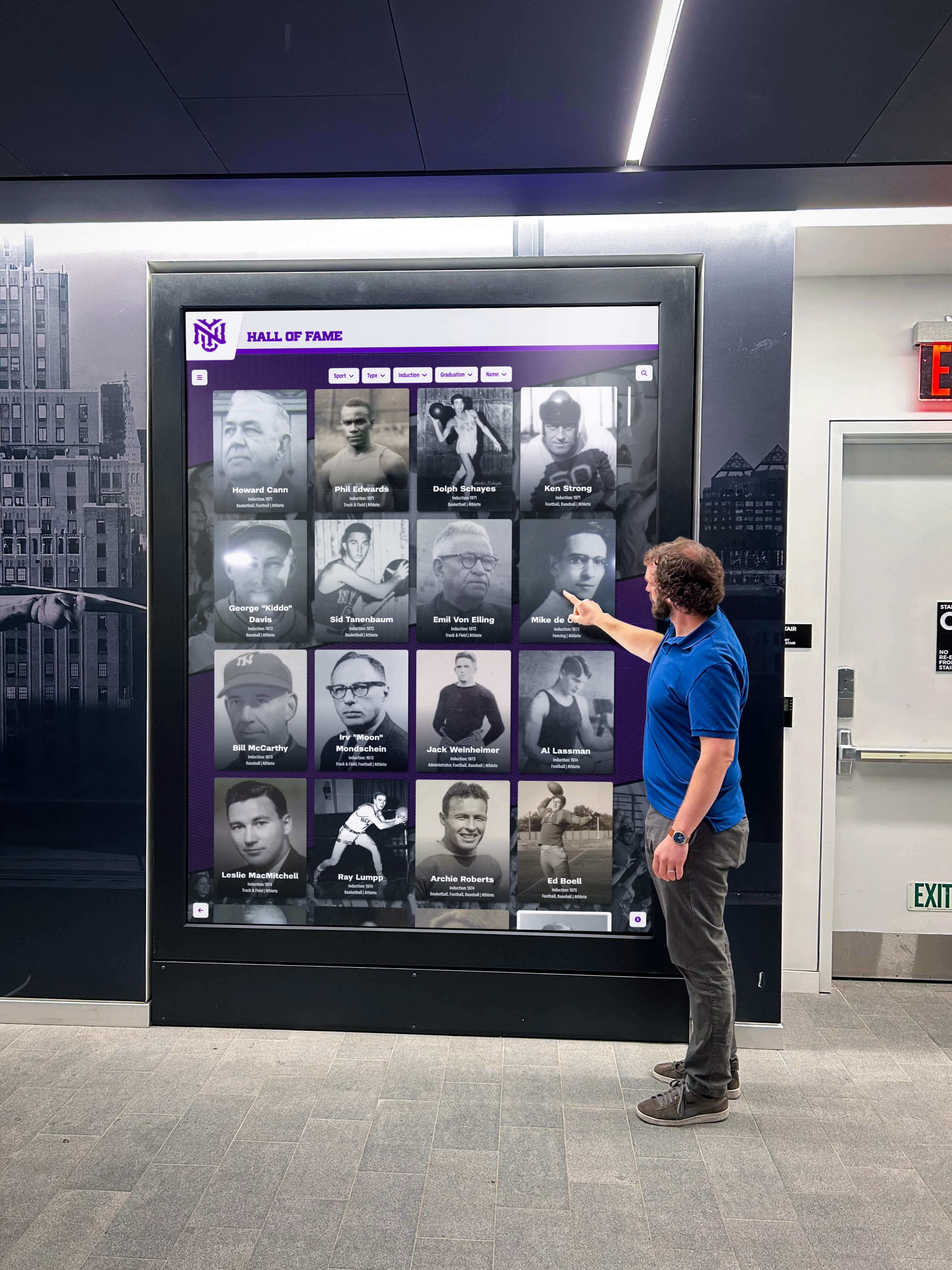
Comprehensive recognition honors volunteers whose service makes church sports ministry possible
These volunteers enable ministry that would otherwise require significant paid staff. Appropriate recognition demonstrates appreciation while encouraging continued service and inspiring others to volunteer. Churches implementing volunteer recognition report increased recruitment and improved retention when service receives visible acknowledgment.
Core Components of Effective Church Sports Recognition
Successful church athletic recognition incorporates elements that celebrate both competitive achievement and ministry impact.
Championship and Tournament Recognition
Competitive success deserves celebration even within ministry contexts emphasizing character and participation.
League Championship Recognition
Churches with internal leagues should systematically recognize championship teams:
Championship Recognition Elements
- Team photos with complete rosters documenting participants
- Season records and tournament results showing competitive journey
- Coach recognition acknowledging volunteer leadership
- Memorable game highlights and defining moments
- Season narratives explaining what made teams special
- Championship trophy or award documentation
This recognition creates tradition and motivation while preserving ministry history across seasons and generations.
External Tournament Success
Many church teams compete in community leagues or regional tournaments providing additional recognition opportunities:
Tournament Achievement Celebration
- Regional or state tournament participation and advancement
- Championship victories in community league competitions
- All-tournament team selections and individual honors
- Particularly memorable games or competitive moments
- Representation of church in broader community athletics
External success provides natural outreach opportunities when church teams compete with excellence and demonstrate Christian character in community settings.
Explore comprehensive athletic recognition approaches in state championships display strategies that celebrate competitive excellence systematically.
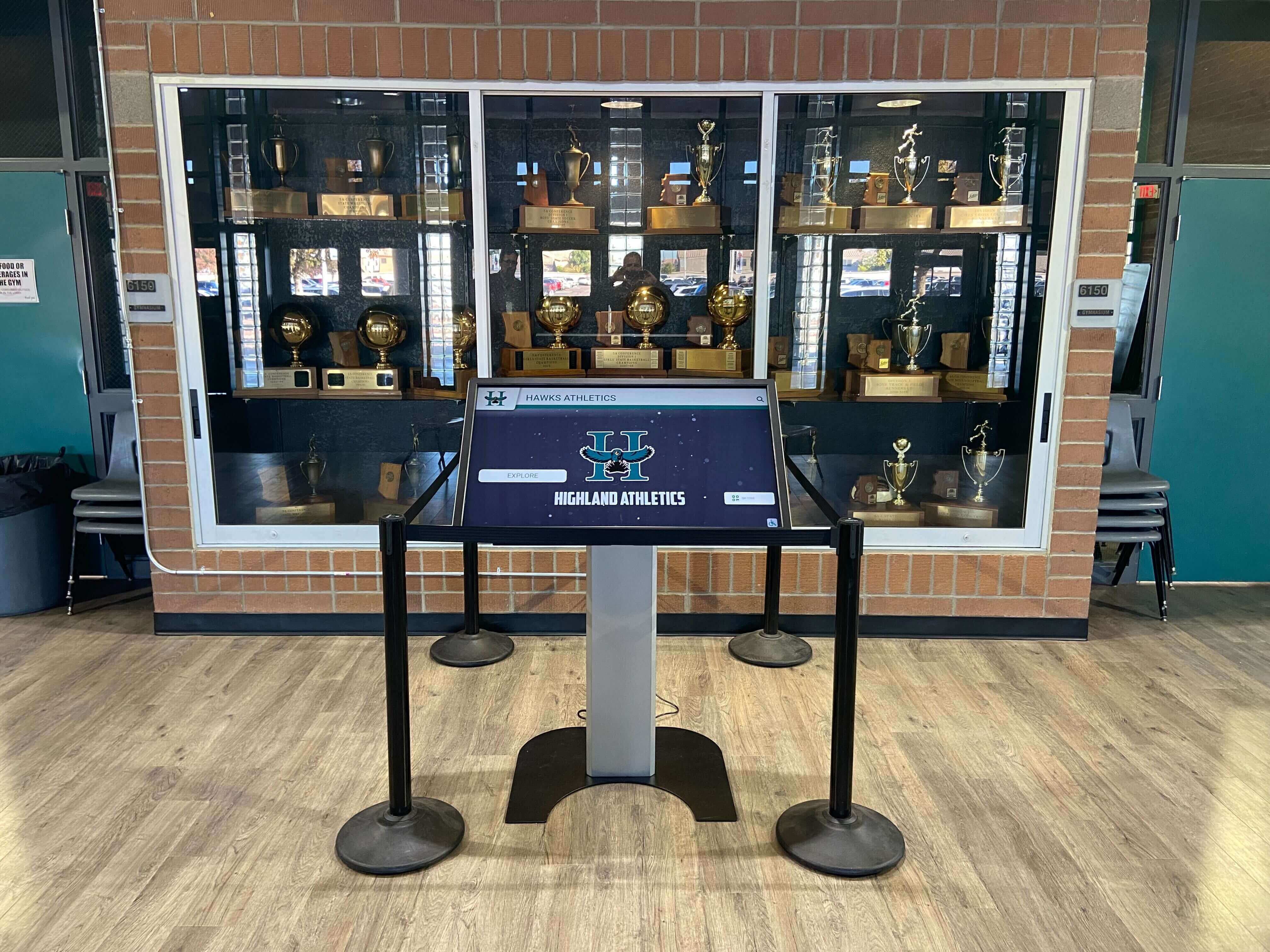
Integrated recognition combines digital storytelling with traditional trophy displays for comprehensive celebration
Character and Sportsmanship Recognition
Church sports uniquely emphasize character development creating recognition categories that reinforce spiritual formation priorities.
Christian Character Awards
Recognize athletes demonstrating faith values through athletic participation:
Character Recognition Categories
- Christlike sportsmanship in victory and defeat
- Servant leadership supporting teammates and opponents
- Encouragement and positive attitude maintenance
- Perseverance through challenges and setbacks
- Integrity in competition and team interactions
- Grace and forgiveness in conflict situations
These awards communicate that character matters as much as competitive success while providing concrete examples of faith-athletic integration for other participants.
Team Unity and Fellowship Awards
Celebrate teams demonstrating exceptional community and mutual support:
Team Character Indicators
- Inclusive team cultures welcoming all skill levels
- Supportive interactions encouraging every member
- Prayer and spiritual support within team contexts
- Service projects or outreach initiatives
- Conflict resolution demonstrating Christian principles
- Lasting friendships extending beyond seasons
Recognition of team character reinforces that athletics serve community building and spiritual formation beyond individual athletic development.
Most Improved and Effort Recognition
Honor athletes showing dedication regardless of natural ability:
Development-Focused Recognition
- Significant skill improvement throughout seasons
- Consistent effort and positive attitude at practice
- Perseverance despite limited playing time
- Coachability and willingness to learn
- Support of teammates and program culture
- Growth mindset and continuous improvement
This recognition ensures all participants can receive acknowledgment for contributions valued within ministry contexts even when competitive achievement remains limited.
Volunteer Leadership Recognition
Volunteer service enables church sports ministry making comprehensive volunteer recognition essential rather than optional.
Coach Recognition and Appreciation
Coaches invest hundreds of hours annually deserving systematic appreciation:
Coach Recognition Elements
- Years of service milestones celebrating sustained commitment
- Championship seasons and competitive achievements under coaching
- Character development impact beyond win-loss records
- Mentorship and spiritual influence on athletes
- Volunteer hour contributions quantifying service impact
- Personal testimonials from athletes and families
Many churches create “Coaches Hall of Honor” sections within sports displays specifically acknowledging volunteer coaching contributions across all programs and generations.

Comprehensive recognition systems honor volunteers, coaches, and athletes who build sports ministry together
Support Volunteer Acknowledgment
Beyond coaches, numerous volunteers enable program operations:
Essential Support Volunteers
- League and program coordinators managing logistics
- Referees and officials ensuring fair competition
- Facility maintenance volunteers caring for spaces
- Concession workers funding program operations
- Registration and administration volunteers
- Equipment managers and setup crews
Creating visible recognition for support volunteers encourages continued service while inspiring others to contribute to ministry success.
Family Involvement Celebration
Church sports often involve entire families creating recognition opportunities:
Family Contribution Recognition
- Team parent coordination and communication
- Transportation and carpooling support
- Spectator encouragement and positive atmosphere
- Fundraising participation and financial support
- Multi-generational family involvement in programs
- Sibling participation across multiple sports and seasons
Family recognition reinforces that church sports ministry involves entire households working together to serve children and community.
Implementing Interactive Touchscreen Recognition Systems
Modern digital displays provide practical solutions for comprehensive church sports recognition that traditional trophy cases and bulletin boards cannot match.
Unlimited Recognition Capacity
Digital systems eliminate the fundamental space constraints that limit traditional recognition approaches.
Comprehensive Program Coverage
Solutions like Rocket Alumni Solutions enable churches to recognize:
Complete Recognition Scope
- All championship teams across all sports and age groups
- Every volunteer coach and support coordinator
- Character award recipients from every season
- Participation recognition for recreational league members
- Historical program achievements from founding through present
- Special events and memorable ministry moments
This unlimited capacity ensures no achievement goes unrecognized due to physical display limitations, no volunteer contributions remain unacknowledged, and complete program history remains accessible rather than selectively edited based on available space.
Multi-Year Archive Building
Digital platforms preserve sports ministry history across generations:
Churches report that comprehensive historical archives demonstrate program longevity and tradition, preserve memories for families whose children participated years earlier, show new families the vitality and continuity of sports ministry, and create institutional memory independent of staff or volunteer turnover.
This historical preservation proves particularly valuable for churches with decades of sports ministry that would require dozens of traditional trophy cases to document comprehensively.
Learn about building comprehensive recognition archives in digital storytelling for athletic programs with systematic documentation approaches.
Multimedia Storytelling Capabilities
Digital recognition enables rich content impossible with physical trophy cases or static displays.
Enhanced Content Types
- High-resolution team and individual photos
- Championship game video highlights
- Coach and athlete testimonial videos
- Season recap presentations
- Character moment documentation
- Volunteer service stories and impact narratives
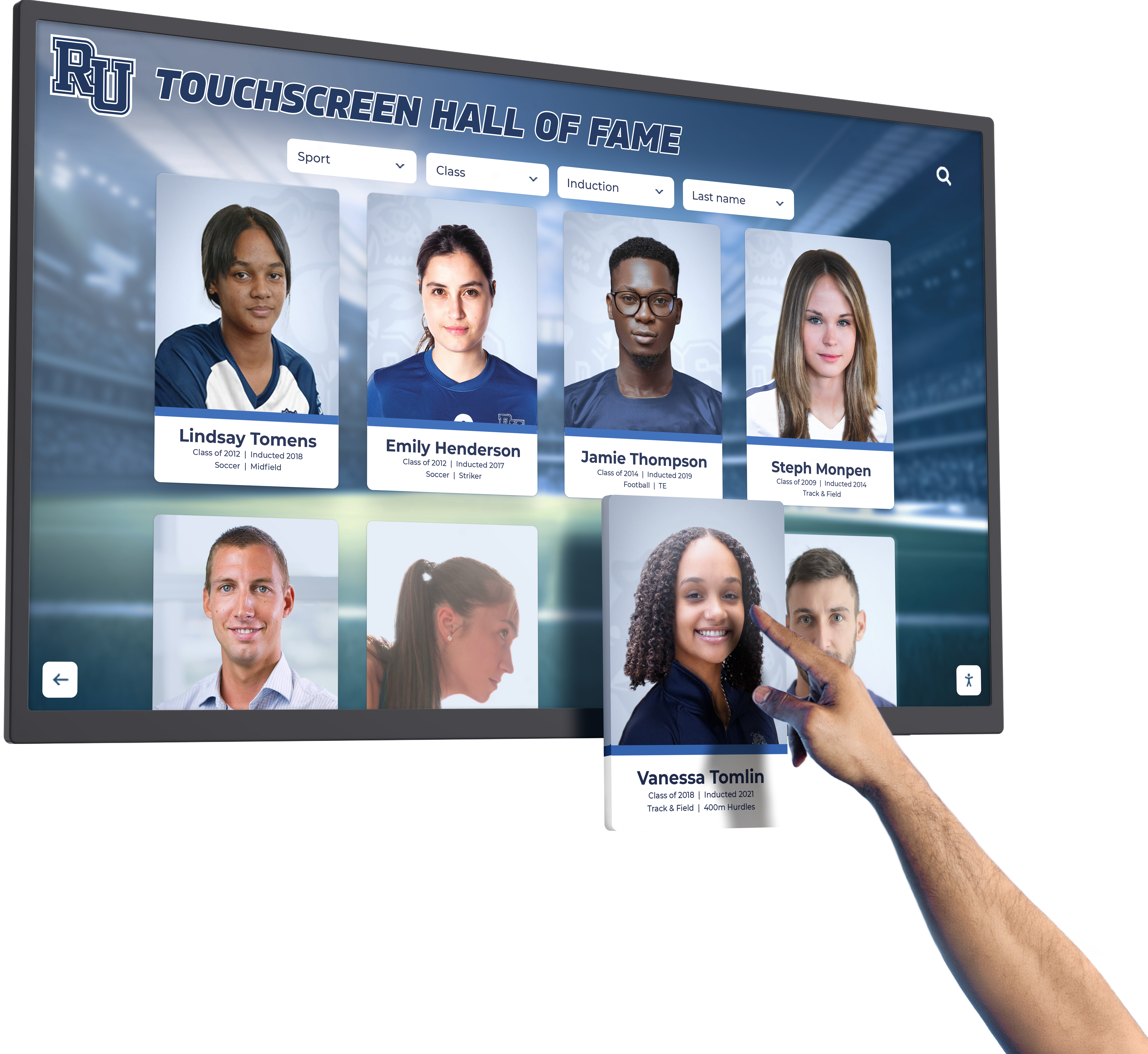
Touchscreen interfaces enable exploring detailed stories behind athletic achievements and ministry impact
Multimedia content transforms basic recognition into engaging storytelling that brings ministry moments to life while creating emotional connections with displayed achievements.
Faith Integration Through Storytelling
Digital platforms enable explicitly connecting athletic achievements with spiritual formation:
Churches can include testimonials from athletes about faith growth through sports, coach reflections on spiritual mentorship opportunities, parent perspectives on ministry impact on families, and scripture connections relevant to featured achievements or character qualities.
This faith integration ensures recognition displays serve ministry mission rather than becoming purely athletic showcase divorced from spiritual purposes.
Interactive Engagement Features
Modern touchscreen systems create engagement that static displays cannot achieve.
Search and Exploration Capabilities
Interactive features enable:
User Navigation Options
- Search by athlete name finding all recognitions
- Filter by sport or season exploring specific programs
- Browse by year seeing program evolution over time
- Sort by recognition type (championships, character awards, volunteers)
- View coach profiles showing complete service histories
- Explore team pages with rosters and season details
This searchability means families can find their children’s recognition immediately, visitors can explore program scope and vitality quickly, and alumni can reconnect with their competitive experiences years later.
Social Sharing Integration
Digital recognition extends impact beyond physical displays:
Families share athlete recognition on social media providing organic ministry promotion, alumni connect with former teammates reminiscing about shared experiences, and community members discover church sports programs through shared content creating outreach opportunities.
Mobile accessibility ensures recognition reaches beyond facility walls to broader audiences supporting ministry visibility and growth.
Explore interactive recognition approaches in interactive touchscreen displays for recognition demonstrating engagement-focused implementation.
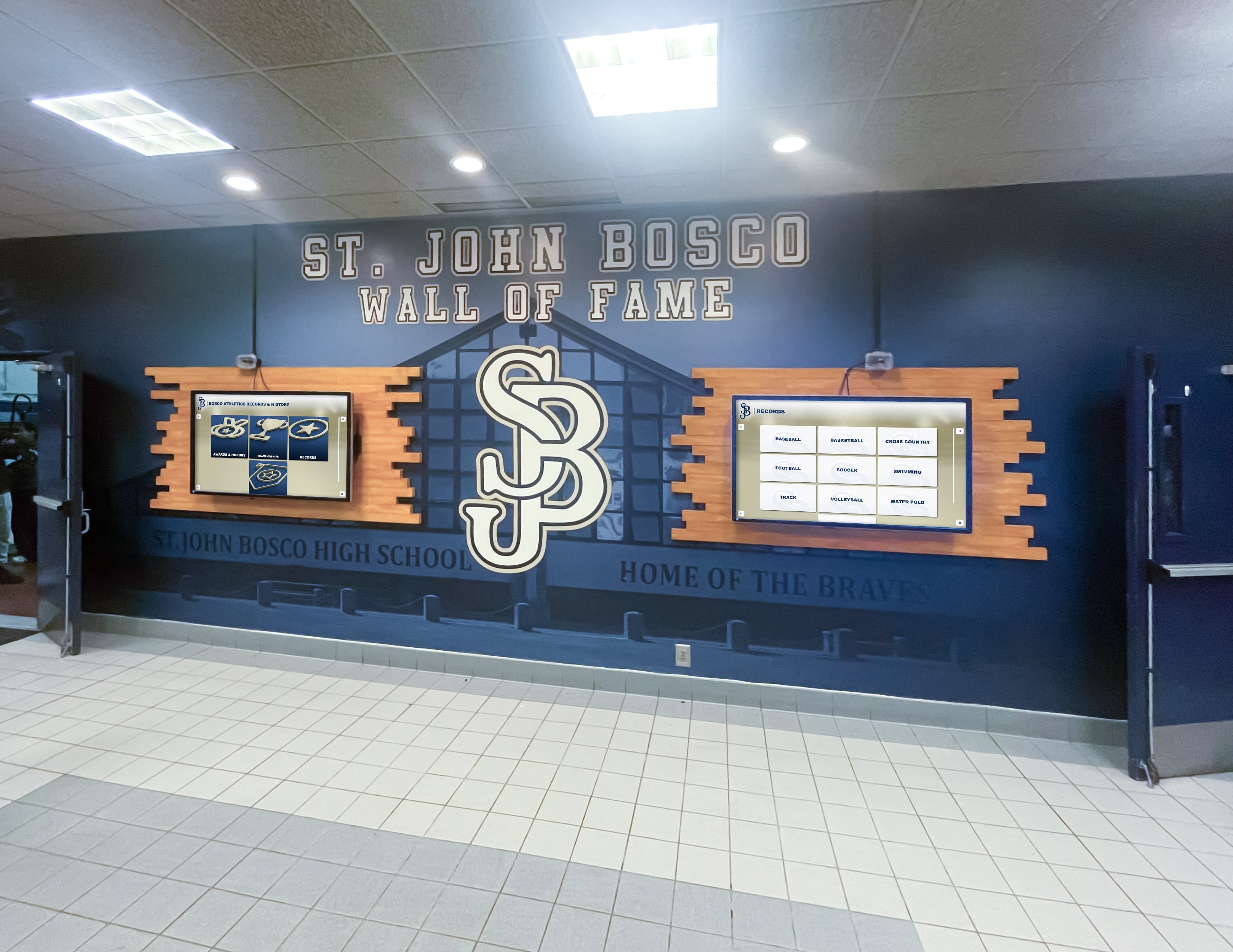
Strategic placement of interactive displays in high-traffic areas ensures maximum recognition visibility
Strategic Implementation for Church Contexts
Successfully implementing sports recognition requires approaches tailored to church organizational structures and ministry priorities.
Planning and Stakeholder Engagement
Effective implementation begins with broad input and clear vision alignment.
Ministry Leadership Involvement
Secure buy-in and input from:
Key Stakeholders
- Senior pastors or ministry leaders connecting sports to overall mission
- Sports ministry directors providing program expertise
- Facility managers addressing installation and placement considerations
- Communications staff ensuring integration with broader ministry promotion
- Finance personnel managing budget and funding approaches
- Volunteer coordinators connecting recognition to recruitment
This broad stakeholder engagement ensures recognition systems serve multiple ministry objectives while gaining necessary organizational support for successful implementation.
Congregation and Participant Input
Gather perspectives from those recognition will honor and serve:
Participant Feedback Sources
- Current athletes and families sharing recognition preferences
- Former participants providing historical context and memories
- Volunteer coaches identifying important program moments
- League administrators understanding recognition gaps
- Facility users observing current limitation problems
This input ensures final systems meet actual needs rather than assumptions about what might work.
Content Development and Historical Research
Comprehensive recognition requires systematic content creation and historical documentation.
Current Program Documentation
Establish processes capturing ongoing ministry activities:
Documentation Workflows
- Season-end team photo sessions with complete rosters
- Championship game video recording or photo documentation
- Character award nomination and selection processes
- Volunteer service hour tracking and appreciation planning
- Parent testimonial and impact story collection
- Statistical records and achievement documentation
These systematic processes ensure nothing falls through cracks and content remains consistently high quality across seasons and programs.
Historical Archive Building
Many churches lack organized sports ministry historical records requiring dedicated research:
Research Methodologies
- Church records and ministry reports documenting program history
- Bulletin and newsletter archives containing sports announcements
- Photo collections from members and former participants
- Facility dedications and renovations providing timeline context
- Oral history interviews with long-time volunteers and participants
- Social media and website archives from recent years
This historical work preserves ministry legacy while creating comprehensive content foundations for recognition displays.
Organizations should review best practices for finding and preserving athletic records applicable to church contexts.
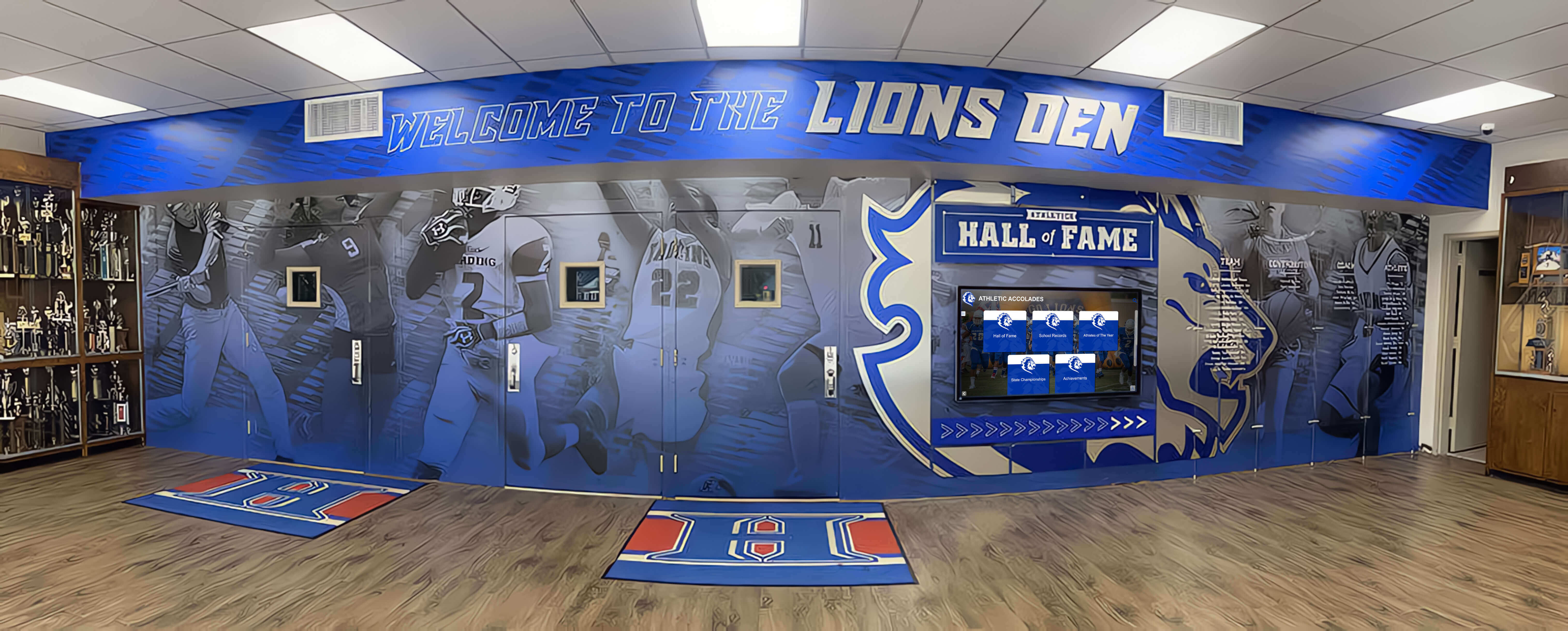
Integrated recognition combines traditional elements with modern technology for comprehensive ministry documentation
Technology Selection and Installation
Appropriate technology choices ensure long-term success and maintainability.
Hardware Considerations for Church Facilities
Church environments present specific technical considerations:
Installation Factors
- Screen size appropriate for viewing distances and traffic patterns
- Durability suitable for high-use public spaces
- Aesthetic integration with existing church architecture and design
- Accessibility compliance ensuring all can engage with displays
- Security features preventing theft or vandalism
- Network connectivity supporting cloud-based content management
Commercial-grade displays rated for continuous operation provide reliability essential for always-on installations in church facilities with varying supervision levels.
Software Platform Requirements
Purpose-built recognition platforms offer advantages over generic digital signage:
Essential Platform Capabilities
- Intuitive content management requiring no technical expertise
- Cloud-based access enabling remote updates from any device
- Unlimited content storage supporting extensive multimedia
- Sports-specific organization structures by season, sport, and category
- Mobile-responsive web access extending recognition beyond physical displays
- Role-based permissions enabling appropriate access levels
Solutions like Rocket Alumni Solutions provide comprehensive platforms specifically designed for institutional recognition needs including churches, schools, and community organizations.
Strategic Placement Decisions
Display location significantly impacts engagement and ministry benefit:
Optimal Church Locations
- Main entrance lobbies welcoming all visitors and members
- Fellowship halls where families gather for meals and events
- Gymnasium lobbies adjacent to athletic facilities
- Children’s ministry areas where parents drop off and pick up
- Multi-purpose rooms hosting league meetings and events
- Outdoor covered areas serving recreational field complexes
Multiple distributed displays ensure recognition reaches diverse audiences throughout facilities rather than limiting visibility to single locations.
Learn about effective placement strategies in digital trophy case implementation with approaches applicable to church environments.
Connecting Sports Recognition to Broader Ministry Goals
Church sports recognition should serve broader spiritual formation and community building objectives beyond athletic celebration alone.
Evangelism and Outreach Opportunities
Sports ministry provides natural relational entry points for unchurched families creating outreach opportunities when appropriately integrated.
Sports as Relationship Bridge
Athletic programs attract families who might not initially attend worship services:
Outreach Pathways
- Recreational leagues welcoming community participation
- Tournament hosting bringing visitors to church facilities
- Coaches building relationships with unchurched families
- Team devotions and chapel services introducing faith naturally
- Family events and celebrations creating community connections
- Service projects and mission opportunities extending beyond athletics
Recognition displays contribute to outreach by demonstrating program quality and vitality that attracts families, showcasing faith integration that differentiates church athletics from purely secular programs, and creating conversation starters between members and visitors exploring facilities.
Ministry Impact Documentation
Beyond athletic achievements, recognition systems can showcase:
Broader Ministry Outcomes
- Spiritual decisions made through sports ministry
- Service projects completed by teams and participants
- Scholarship and assistance provided to families
- Community partnerships and local impact
- Mission trip connections and support
- Life change stories demonstrating transformation
This holistic documentation reinforces that sports ministry serves broader kingdom purposes rather than existing as isolated recreational programming.
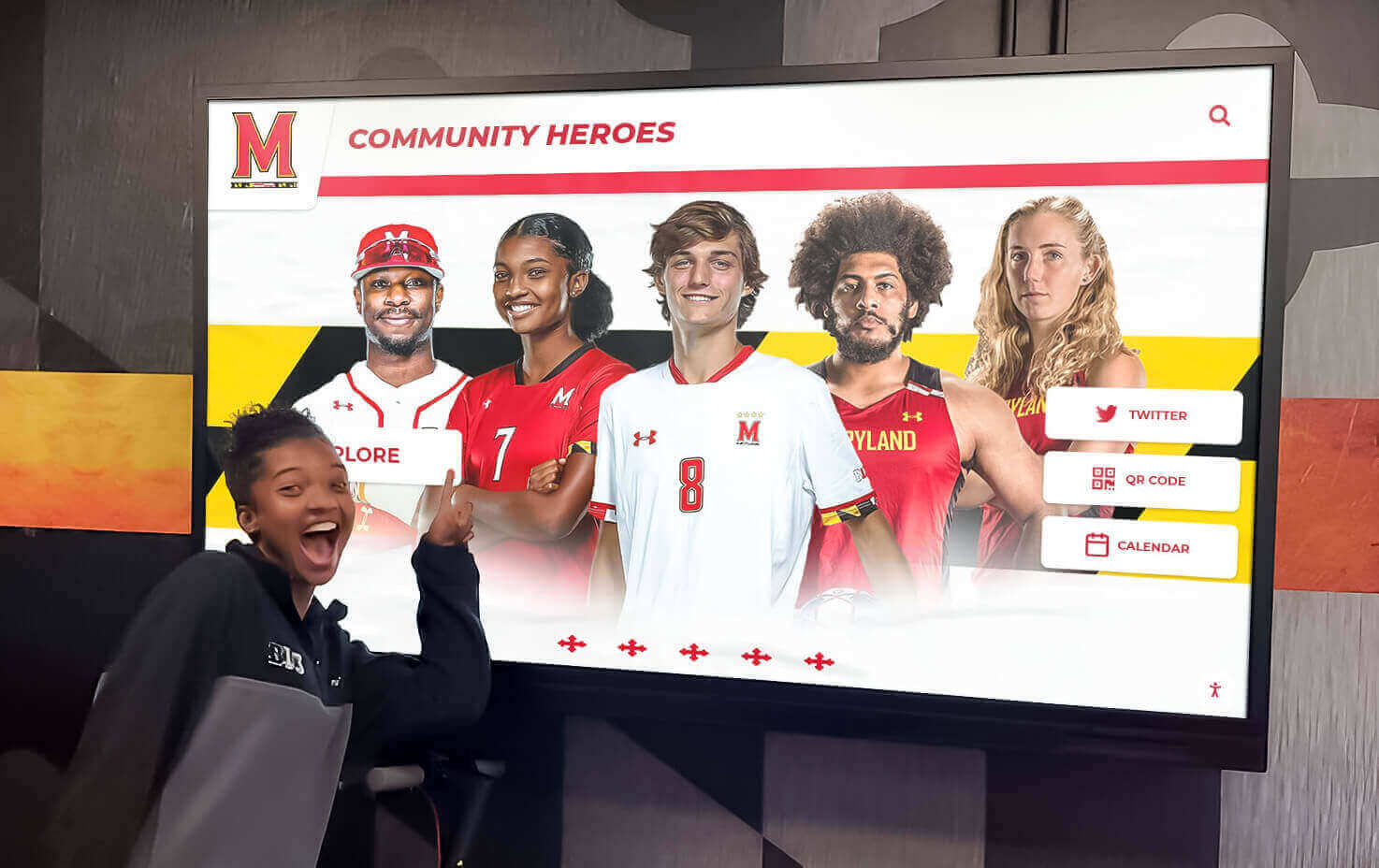
Recognition displays inspire young people while demonstrating how athletics serve broader community impact
Discipleship and Spiritual Formation
Sports provide contexts for spiritual development when ministry intentionally integrates faith with athletics.
Biblical Principles Through Athletics
Churches can use recognition to highlight faith-sports connections:
Spiritual Formation Themes
- Perseverance and endurance connecting to spiritual growth
- Teamwork and unity reflecting body of Christ theology
- Discipline and training paralleling spiritual formation
- Victory and defeat teaching dependence on God
- Sacrifice and service modeling Christlike leadership
- Grace and forgiveness demonstrated in competitive contexts
Recognition displays featuring these connections reinforce that athletics serve spiritual formation rather than existing separately from faith development.
Coach as Spiritual Mentor Recognition
Volunteer coaches often serve as spiritual mentors deserving acknowledgment:
Highlighting coach mentorship and spiritual influence, testimonials from athletes about faith impact, and examples of biblical teaching through athletic contexts communicates that coaching involves more than skill development within church sports ministry.
Community Building and Member Connection
Sports create natural fellowship opportunities strengthening congregational relationships.
Inter-Generational Connection
Church sports uniquely span age ranges creating cross-generational relationships:
Multi-Generational Opportunities
- Youth athletes interacting with adult league participants
- Grandparents attending grandchildren’s games and events
- Teenage referees and scorekeepers serving younger leagues
- Alumni returning to coach or volunteer in current programs
- Family dynasties with multiple generations participating
Recognition celebrating these inter-generational connections reinforces community-building value beyond individual athletic achievement.
Small Group and Fellowship Enhancement
Sports teams often evolve into small groups and lasting friendships:
Churches report that sports teams praying together regularly, families forming friendships extending beyond athletics, teams serving together in mission projects, and participants connecting in worship and other church activities demonstrate how athletics strengthen broader congregational life.
Recognition can highlight these community outcomes showing sports ministry’s contribution to overall church health and fellowship.
Explore community-building approaches in community engagement strategies applicable to faith-based organizations.
Budget and Funding Strategies for Church Recognition
Churches implementing sports recognition need realistic financial planning and creative funding approaches.
Investment Cost Considerations
Understanding typical investment ranges helps churches plan appropriately:
Recognition System Investment Levels
- Basic single-display systems: $8,000-$15,000 including hardware, software, installation, and initial content
- Comprehensive multi-display installations: $15,000-$30,000 with larger screens and additional locations
- Premium systems with custom integration: $30,000-$50,000+ for extensive facilities with complex requirements
Ongoing costs include annual platform subscription fees ($1,200-$3,000 typically), periodic hardware maintenance and eventual replacement, and staff time for content management and updates.
Creative Funding Approaches
Churches successfully fund recognition systems through diverse sources:
Funding Strategies
- Sports ministry budget allocations demonstrating program priority
- Memorial gifts honoring deceased members with sports connections
- Donor campaigns specifically for recognition implementation
- Corporate sponsorships from local businesses with facility visibility
- Fundraising events hosted by sports programs
- Capital campaign components within broader facility projects
- In-kind contributions of installation or content services
The tangible, visible nature of recognition displays makes them attractive to donors seeking concrete ministry impact from contributions.
Return on Investment Considerations
While recognition involves significant investment, churches report multiple benefits justifying costs:
Quantifiable Ministry Benefits
- Increased sports program participation and family engagement
- Enhanced volunteer recruitment and retention
- Improved facility perception by visitors and prospective members
- Strengthened alumni connections and potential giving
- Reduced staff time updating traditional bulletin boards and displays
- Extended ministry reach through social media sharing
Many churches discover recognition investments support multiple ministry objectives simultaneously while providing decades of ongoing value.
Phased Implementation Approaches
Limited budgets need not prevent recognition implementation:
Phased Strategies
- Start with single high-traffic location expanding later
- Launch with current content adding historical archives over time
- Begin with priority sports or programs expanding systematically
- Use volunteer labor for content creation reducing initial costs
- Implement basic systems with future feature additions planned
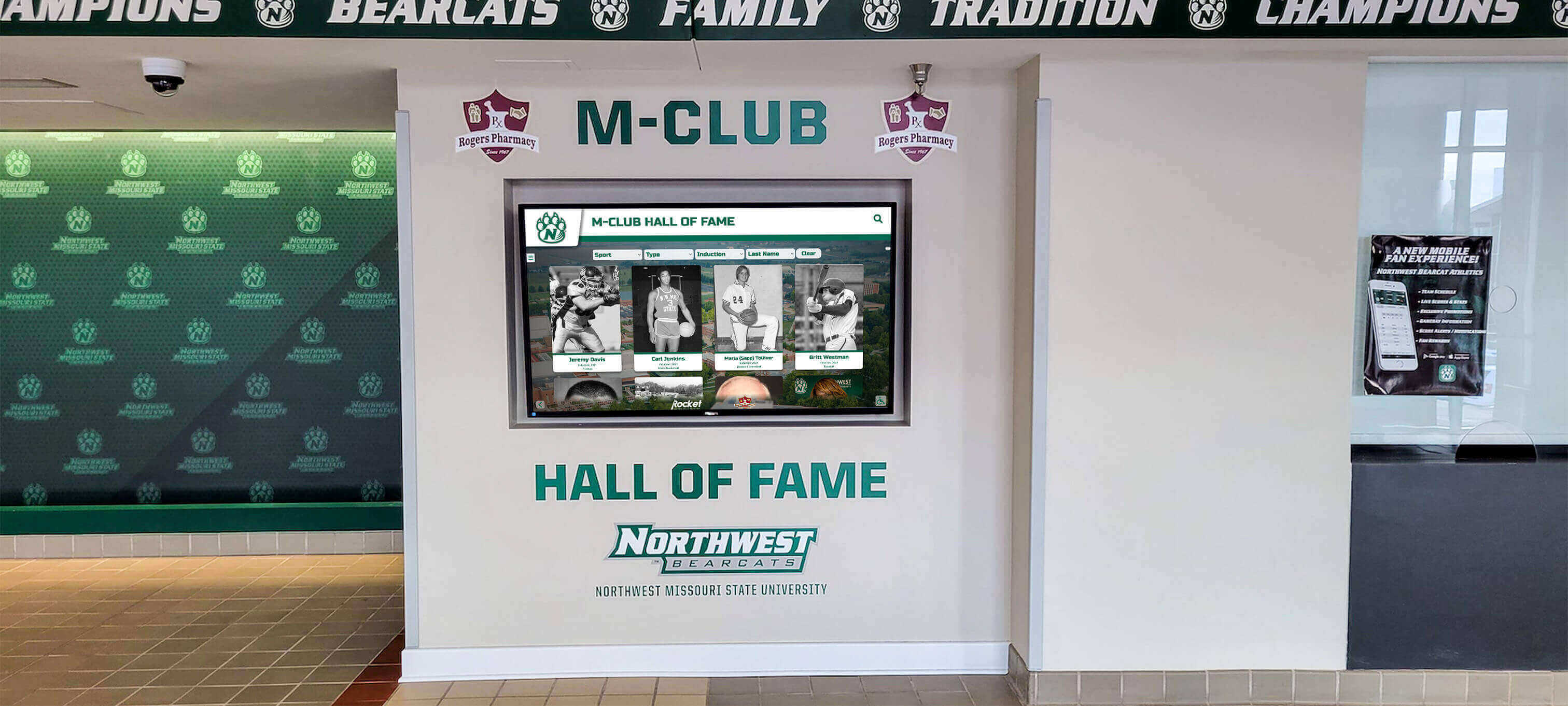
Professional installations demonstrate ministry commitment while remaining scalable to organizational capacity
Phased approaches make recognition accessible while allowing ministries to demonstrate value before expanding investments.
Measuring Sports Recognition Ministry Impact
Assessment demonstrates whether recognition systems achieve intended ministry outcomes while identifying improvement opportunities.
Quantitative Engagement Metrics
Digital platforms provide concrete usage data:
Measurable Indicators
- Display interaction frequency and session duration
- Most-viewed content revealing participant interests
- Search patterns showing how users navigate recognition
- Peak usage times informing content scheduling
- Social media sharing frequency indicating organic promotion
- Web platform visits from remote users
These metrics reveal whether recognition generates intended engagement or requires strategy adjustments.
Qualitative Ministry Assessment
Beyond numbers, observe cultural and relational impacts:
Qualitative Indicators
- Participant and family satisfaction with recognition approaches
- Volunteer recruitment and retention improvements
- Visitor comments and facility tour responses
- Alumni engagement and connection strengthening
- Community perception of sports ministry quality
- Spiritual formation conversations catalyzed by displays
Regular feedback collection enables continuous improvement ensuring recognition remains effective and aligned with ministry objectives.
Ministry Outcome Documentation
Connect recognition to broader ministry results:
Ministry Impact Measures
- Program participation growth and demographic expansion
- Volunteer service hours and coordinator retention
- Salvations or spiritual decisions through sports ministry
- Service projects and mission connections
- Family engagement in broader church life
- Community partnerships and local witness
Positive trends suggest recognition contributes to ministry effectiveness beyond simple participant appreciation.
Special Considerations for Faith-Based Recognition
Church sports recognition requires sensitivity to theological and cultural considerations that secular programs may not address.
Balancing Competition and Christian Values
Churches must navigate tension between competitive excellence and faith formation priorities.
Healthy Competition Frameworks
Recognition should reinforce that:
- Competition provides context for character development rather than defining personal worth
- Excellence honors God through developing gifts fully while avoiding idolatry of winning
- Opponents deserve respect and grace as fellow image-bearers rather than enemies
- Losing provides growth opportunities rather than indicating failure
- Team success matters more than individual glory reflecting kingdom values
Display content and recognition categories should consistently communicate these balanced perspectives.
Inclusive Recognition Approaches
Church sports should welcome participants at all skill levels creating recognition challenges:
Participation vs. Excellence Balance
Effective approaches recognize competitive achievement appropriately without making non-competitive participants feel undervalued, celebrate character development and effort alongside championships, and honor volunteer service enabling all participation levels.
This balance ensures competitive athletes feel achievement matters while recreational participants feel equally valued for contributions to community building and ministry impact.
Denominational and Theological Sensitivity
Different faith traditions emphasize various aspects of sports ministry:
Some churches prioritize evangelism and outreach through athletics, others emphasize community building and fellowship, some focus on character development and life skills, while others combine competitive excellence with spiritual formation.
Recognition systems should align with particular church theological emphases and ministry philosophies rather than importing approaches that may conflict with congregational values or priorities.
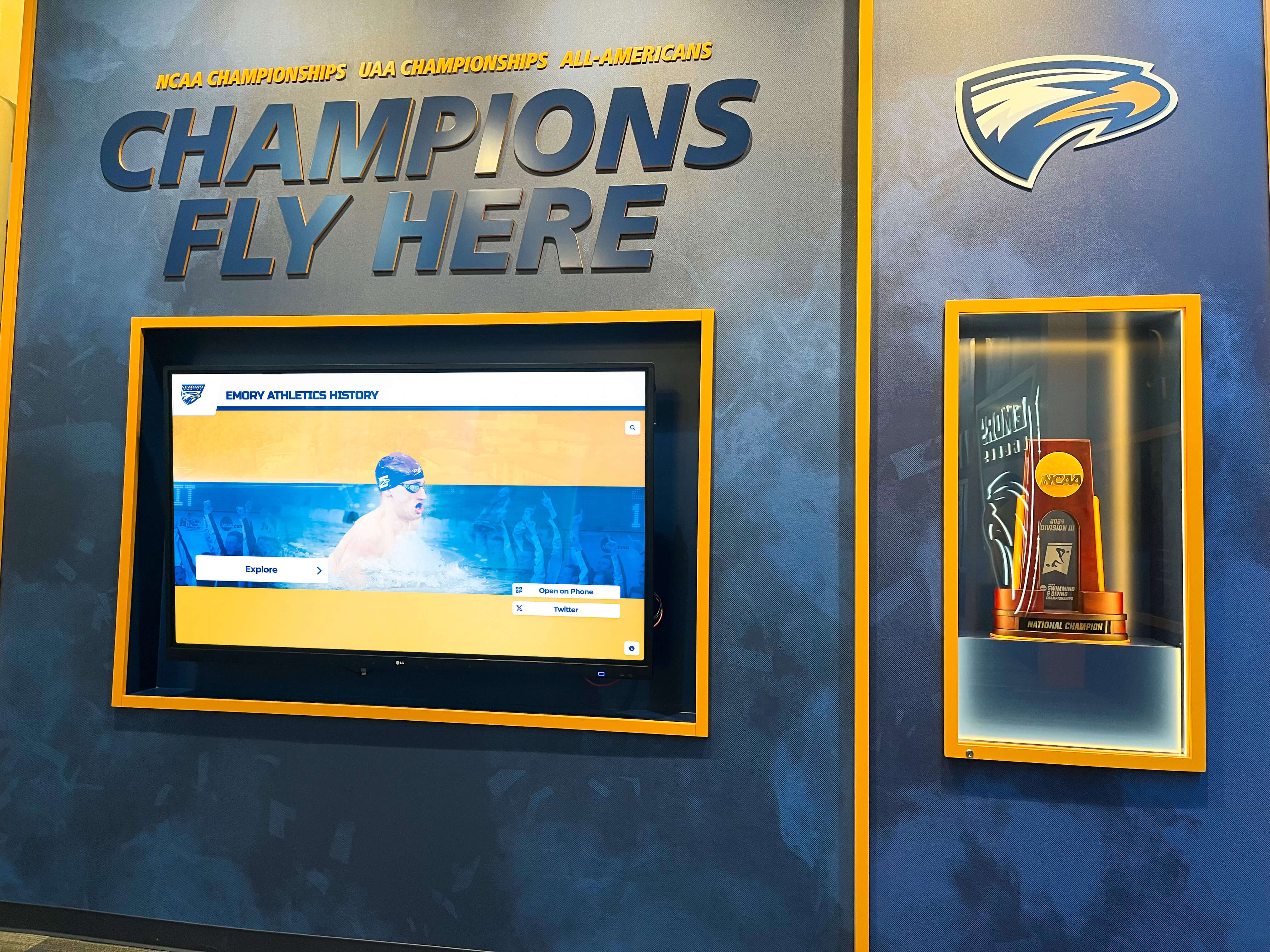
Recognition systems can honor competitive excellence while maintaining focus on ministry priorities and spiritual formation
Conclusion: Celebrating Ministry Through Athletic Recognition
Church sports programs create unique opportunities for spiritual formation, community building, and outreach that deserve recognition systems honoring both competitive achievement and ministry impact. When churches systematically celebrate championship teams alongside character development, volunteer service alongside tournament victories, and community building alongside athletic excellence, they reinforce that sports ministry serves broader kingdom purposes beyond recreation or competition alone.
The strategies explored in this guide provide comprehensive frameworks for implementing recognition that celebrates athletic achievement appropriately, honors volunteer service enabling ministry, preserves program legacy across generations, and demonstrates sports ministry vitality to participants, visitors, and community members. From digital interactive displays eliminating space constraints to systematic documentation preserving ministry history, these approaches overcome traditional limitations while creating engaging recognition experiences impossible with bulletin boards and trophy cases alone.
Transform Your Church Sports Recognition
Discover how modern interactive display solutions can help you celebrate every athlete, honor all volunteers, and strengthen sports ministry that builds community while advancing spiritual formation.
Explore Recognition SolutionsDigital recognition platforms like Rocket Alumni Solutions provide purpose-built systems specifically designed for institutional athletic recognition including churches, schools, and community organizations. These platforms combine unlimited recognition capacity with intuitive management, multimedia storytelling capabilities, and engaging interactive experiences that honor participants while serving ministry objectives effectively.
Start wherever current situations permit—whether implementing comprehensive recognition systems or beginning with priority programs while planning expansion—then systematically build displays your sports ministry deserves. Every athlete who receives meaningful recognition for achievements develops stronger connections to church community while seeing faith integrated practically with athletics. Every volunteer acknowledged for service feels valued while inspiring others to contribute. Every family exploring your facilities discovers vibrant sports ministry demonstrating your church’s commitment to holistic development and community building.
Your church sports ministry represents significant investment of volunteer hours, facility resources, and congregational support that deserves recognition systems celebrating this ministry appropriately. With thoughtful planning, appropriate technology selection, and systematic implementation, you can create recognition that preserves program legacy, honors all participants, and demonstrates how athletics serve spiritual formation and community building within faith contexts.
Ready to begin? Explore how Rocket Alumni Solutions can help you create comprehensive church sports recognition that celebrates ministry impact while supporting the community building and spiritual formation essential to faith-based athletic programs that integrate competition with Christian values and discipleship.




































